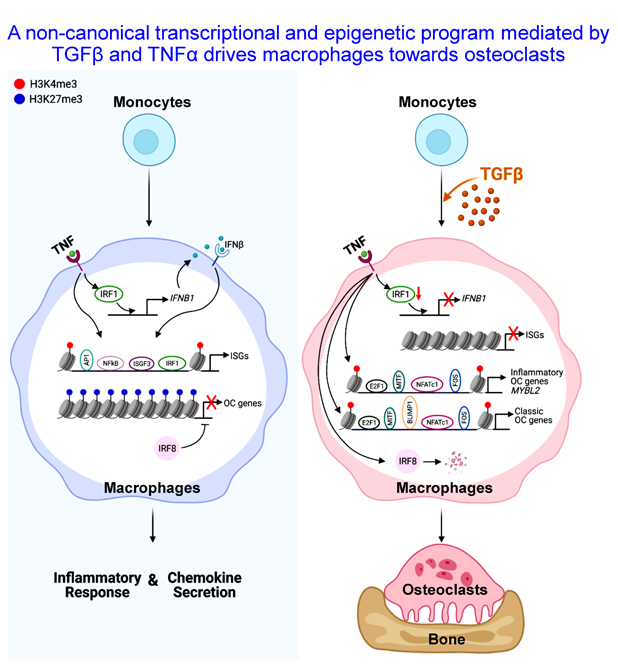
Research
Many skeletal diseases are largely associated with or caused by inflammation. However, the underlying mechanisms are far from understood. Our lab studies osteoimmunology, an interdisciplinary field linking bone biology and the immune system, focusing on inflammatory regulation of gene expression and signaling in macrophage differentiation to osteoclasts (see the model of a new molecular regulatory network we recently identified), adipogenesis, skeletal damage and repair involved in disease (such as osteoporosis and inflammatory arthritis). We equip genetic approaches (knockout and transgenic mice), primary cells (for example, bone marrow cells and PBMCs), a combination of molecular and cellular methods, various next-generation techniques (RNAseq, ATACseq, ChIPseq, scRNAseq), multi-omics approaches, and disease models (such as RA, osteoporosis, fracture, high fat diet-induced obesity/type-2 diabetes mouse models). We work extensively on signal transduction and crosstalk, genetic and epigenetic regulation of gene transcription and function, cell differentiation and in vivo bone remodeling and metabolism. We are dedicated to advancing scientific knowledge addressing how the immune system regulates the skeleton and identifying novel therapeutic targets for improving musculoskeletal diseases associated with inflammation.
skeletal diseases are largely associated with or caused by inflammation. However, the underlying mechanisms are far from understood. Our lab studies osteoimmunology, an interdisciplinary field linking bone biology and the immune system, focusing on inflammatory regulation of gene expression and signaling in macrophage differentiation to osteoclasts (see the model of a new molecular regulatory network we recently identified), adipogenesis, skeletal damage and repair involved in disease (such as osteoporosis and inflammatory arthritis). We equip genetic approaches (knockout and transgenic mice), primary cells (for example, bone marrow cells and PBMCs), a combination of molecular and cellular methods, various next-generation techniques (RNAseq, ATACseq, ChIPseq, scRNAseq), multi-omics approaches, and disease models (such as RA, osteoporosis, fracture, high fat diet-induced obesity/type-2 diabetes mouse models). We work extensively on signal transduction and crosstalk, genetic and epigenetic regulation of gene transcription and function, cell differentiation and in vivo bone remodeling and metabolism. We are dedicated to advancing scientific knowledge addressing how the immune system regulates the skeleton and identifying novel therapeutic targets for improving musculoskeletal diseases associated with inflammation.
Figure 1

Current Projects:
- Cell fate determination by TNF and TGFβ interactions
- Bone marrow skeletal stem cell/progenitor cell differentiation
- LncRNA function in skeleton
Bio
Dr. Baohong Zhao earned her bachelor’s degree in medicine from Peking University in 1999 and DMD degree in 2001. She obtained her Ph.D. degree in 2008 from Showa University. Dr. Zhao completed postdoctoral training in immunology with Dr. Lionel Ivashkiv in Weill Cornell Medicine. Dr. Zhao was appointed as an assistant professor in the Department of Medicine at Weill Cornell Medical College in 2014 and established her lab at the Research Institute at the Hospital for Special Surgery that same year. She was promoted to full professor at Weill Cornell Medical College in 2024. In addition to her dedication to research, Dr. Zhao actively contributes to study sections, grant review panels, editorial boards, leadership roles in scientific committees and academic societies, as well as graduate and postdoctoral training programs.
Distinctions:
- NIH Pathway to Independence Award (2012)
- Robert and Gillian Steel Endowed Fellow in Musculoskeletal Research, Hospital for Special Surgery (2020)
- Fellow of the American Society for Bone and Mineral Research (ASBMR) (2021)
